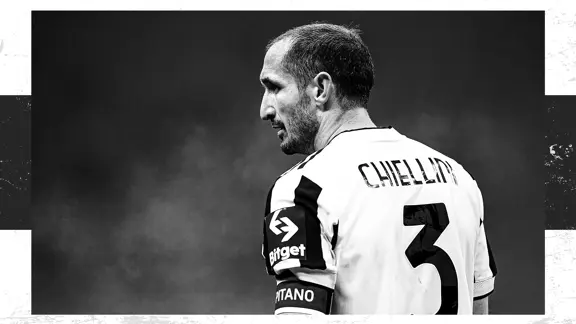Player Story
Giorgio Chiellini: "We must no longer pretend that racism doesn’t exist in our society"

This article is a part of a series that highlights the personal impact of racism and discrimination in the game from the players’ perspectives. For more insights or to download the full report, click here.
There was one incident about three years ago which really got me thinking. We were playing Cagliari, when my teammate Blaire Matuidi - a lovely, quiet lad – suddenly started showing incredible distress and we just couldn’t calm him down. It turned out that he had heard racist insults from the stands and was completely shaken up.
At the time, I found this difficult to handle because we were in the middle of a match. There were just a few minutes left and it was a decisive moment in the game. My first thought - and honestly, in retrospect it was probably the wrong one - was “Blaise, calm down. Let’s get with playing and think about it afterwards!”. If I could have my time again, I’d try to help him immediately, instead of only at the end of the match.
It would probably have been better to stop the game for a bit longer, speak to the referee and the other team to make a clear statement about how unacceptable it was and that we couldn’t go on like that. This would have had greater visibility. As it was, the racist abuse went almost unnoticed, as if it had been a normal insult, when it is actually anything but.
This is not a new issue. Perhaps we did not talk about it as much in the past because there was less understanding, but these forms of discrimination can no longer be tolerated in today’s world. Whether it is discrimination connected to skin colour, racism, sexual orientation or anything else - this is a matter of respect for people. It really is unbelievable that people should have to be ashamed of being who they are.
Earlier this season, during a match between Napoli and Fiorentina, there was perhaps the most well-known case of racism inside a stadium in Italy, although there have been plenty in recent years. When it happened, I sent a message to Kalidou Koulibaly, who I have a good relationship with. We are now taking a stronger stance because we need to make our voices heard on these things.
We players are thought of as “objects” who should just get on with playing football, because that is what we’re paid to do. But we have to speak up on these dynamics, make our voices heard and really take a stand.
We know we must do something but what isn’t easy, however, is knowing how we can do more. We cannot wait any longer, we should not wait until something happens to another player to react. We should not have to be offended to do something.
We are all responsible as a society for what happens and what continues to happen - everyone needs to take ownership and show that behaviour like this is truly unacceptable.
🗣 "Those of us who do not directly experience discrimination must stand up and be better allies – as captains, as teammates, as humans."
— FIFPRO (@FIFPRO) December 1, 2021
✍️ Giorgio @Chiellini
The @JuventusFC and @Azzurri captain pledges his support to those who are discriminated against.#ItsPersonal
I still think that ultimately institutions, those who make regulations and laws, have the most to do. However, in recent months I have been thinking about what I can do to be an ally. When a discriminatory incident in a stadium happens again - I’m a born optimist, and even I am sure it most certainly will - we must be strong enough to take a stand. As footballers, we have this great popularity and with that comes plenty of influence over young people.
This brings with it a responsibility to do more to help future generations and make the world a better place to live in.
When you speak up and take a strong stand, you can be criticised by some and praised by others. This is part of the game, but my conscience tells me that it is time we take this responsibility. I’ve got broad shoulders and can take a bit of flak, although I think any criticisms on a subject like this is really weak.
The things which need highlighting most are solidarity, a desire to listen and standing shoulder to shoulder. This is the basis for everything, to be strong enough to really help future generations live much better lives than ours.
